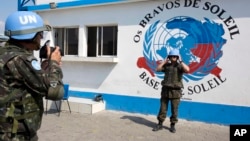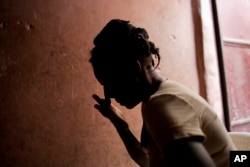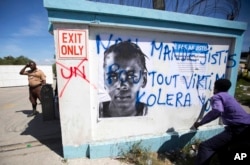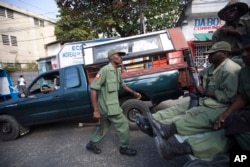As the U.N. Security Council prepares to vote Thursday on whether to end its peacekeeping mission in Haiti in favor of a smaller police detail, the prospect of international troops departing has evoked concern about security gaps. But there's also widespread enthusiasm to send off the peacekeepers, who've been accused of everything from indifference to sexual predation.
"We face insecurity at night. There is a lot of shooting after 5 p.m. when MINUSTAH troops are not present in the streets," Menard Eliphete, 54, a mason in Hinche, told a VOA reporter. He used the acronym for the U.N. Haiti stabilization mission.
"My message for the peacekeepers is bon voyage, good riddance," said Marleine Bastien, executive director of the Haitian Women of Miami.
Women 'abused over and over'
The Florida-based nonprofit advocates for Haitian women in the diaspora and "in the motherland," said Bastien, a native of the Caribbean country.
Speaking by telephone from her office Wednesday, Bastien said she'd collaborated for years with Haiti-based rights groups complaining of peacekeepers not intervening to halt acts of violence and, in some cases, of sexually exploiting vulnerable women and children themselves.
"Women were abused over and over, then impregnated, and they [peacekeepers] refused to pay child support," Bastien said.
Bastien's comments echo the findings of an Associated Press expose released Wednesday. Its review of U.N. peacekeeping missions over the past 12 years revealed roughly 2,000 allegations of sexual abuse globally that were perpetrated by peacekeepers or other U.N. staff. Some 300 of those accusations involved child victims. But few people were ever prosecuted.
The AP also noted a U.N. report acknowledging a child sex ring in which nine Haitian children were victimized by 134 Sri Lankan peacekeepers from 2004 to 2007. Most were deported to their home country. None spent time in prison.
As AP reported, the United Nations "has no jurisdiction over peacekeepers, leaving punishment to the countries that contribute the troops."
UN force in Haiti 13 years
More than 2,300 peacekeepers currently are in Haiti, coming from 53 countries. More than 900 have come from Brazil alone, with contingents from other Latin American countries — especially Chile and Uruguay — as well as India, Jordan, Nepal and Pakistan.
Peacekeepers have maintained a steady presence in Haiti since 2004, when they were sent in to quell violence after then-President Jean-Bertrand Aristide was overthrown and exiled. They have stayed through deadly natural disasters, including a 2010 earthquake and last fall's Hurricane Matthew. They also have been accused of introducing a cholera epidemic that has killed at least 9,300 people.
Those 2,300-plus troops would be pulled out over the next six months if the mission is pared, and its current budget of $345 million would decline, too.
The Trump administration's plan to make deep cuts in foreign aid is a concern for the United Nations. The United States is the top financial contributor to U.N. peacekeeping and its 16 missions, assessed for more than a quarter of the costs in 2016.
Peacekeepers strengthened police
The proposed reduced U.N. mission would have no more than 250 police and civilians supporting the country's national police, Sandra Honoré, the U.N. special representative to Haiti, told VOA in a phone interview Tuesday.
Honoré said she was satisfied with the U.N.'s work "in helping professionalize" the Haitian national police force, the justice system and other Haitian institutions. "We promoted democracy, the electoral process and human rights in the country."
"The United Nations will continue to strengthen the capacity of the national police," Honoré added, noting the current force is 14,000 strong — about 2,000 short of a goal set for last year. She said the U.N. would continue pressing for more female police officers.
Honoré, noting protesters threw stones at Haitian President Jovenel Moise's motorcade last week, acknowledged that "the security climate today in Haiti is not perfect," but, she added, there has been "considerable progress."
Revive national army?
Some Haitians have called for addressing security issues by resurrecting a national army, disbanded in 1995.
"We have a lot of insecurity problems," said Kesnel Casimir, a stone breaker in Hinche. " ...The Haitian government should remobilize the Haitian army to replace the U.N. forces."
"The Haitian police can't play the military role," Jean Renel Senatus, chairman of the Haitian Senate's justice and public safety committee, told VOA in a radio interview. " ... Haitian security can't be guaranteed if our port and airport are not well protected. ... The Haitian army is a must" for security after MINUSTAH's departure.
The United States, Haiti's biggest benefactor, opposes such a move. Earlier this year, Kenneth Merten, the State Department's special coordinator for Haiti, told VOA, "We've spent a lot of money so Haiti could have a police force that is competent and transparent."
This report was prepared by VOA's Creole Service, with correspondent Josue Joseph contributing from Hinche, Haiti.







